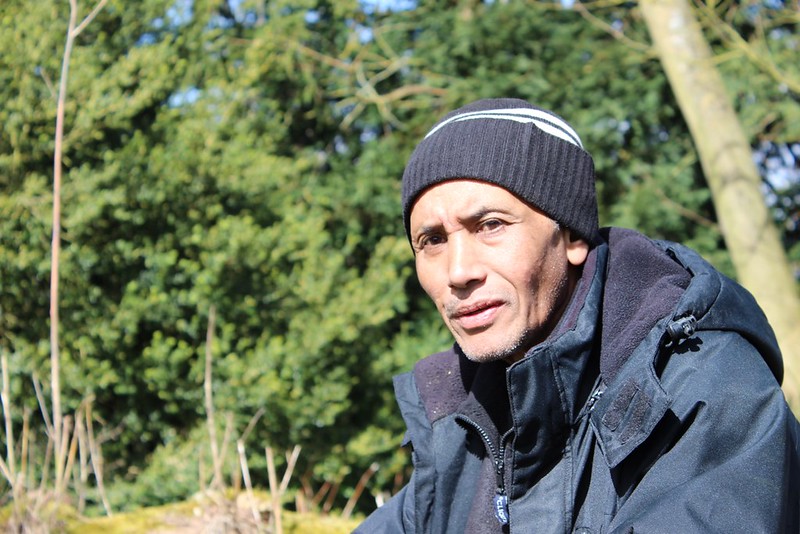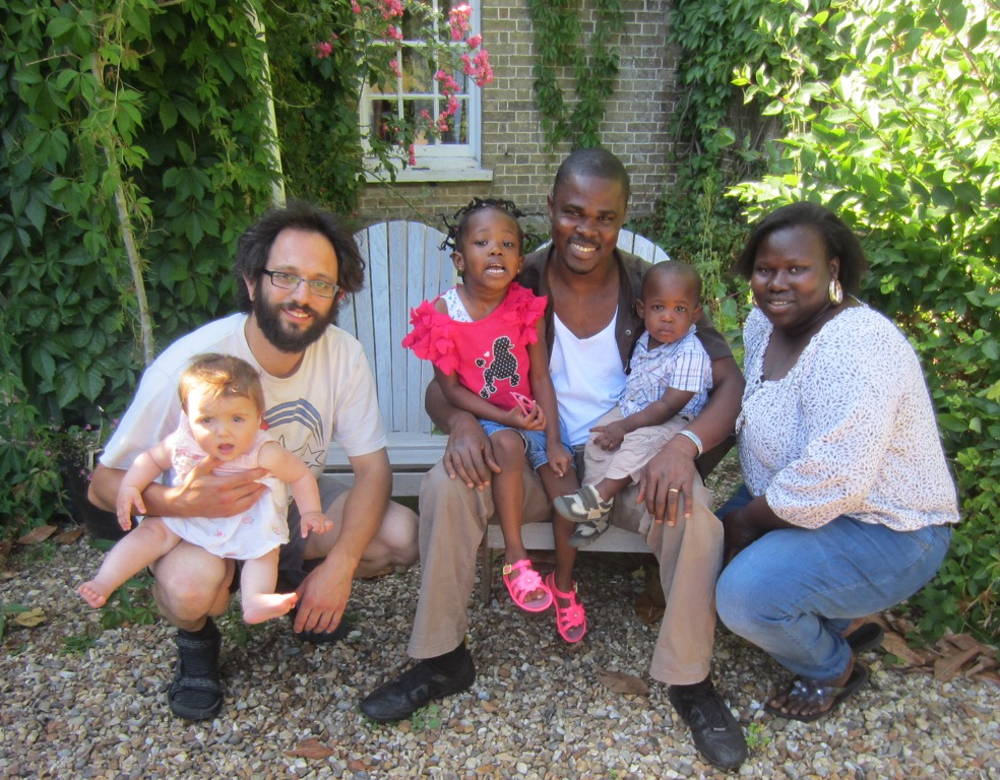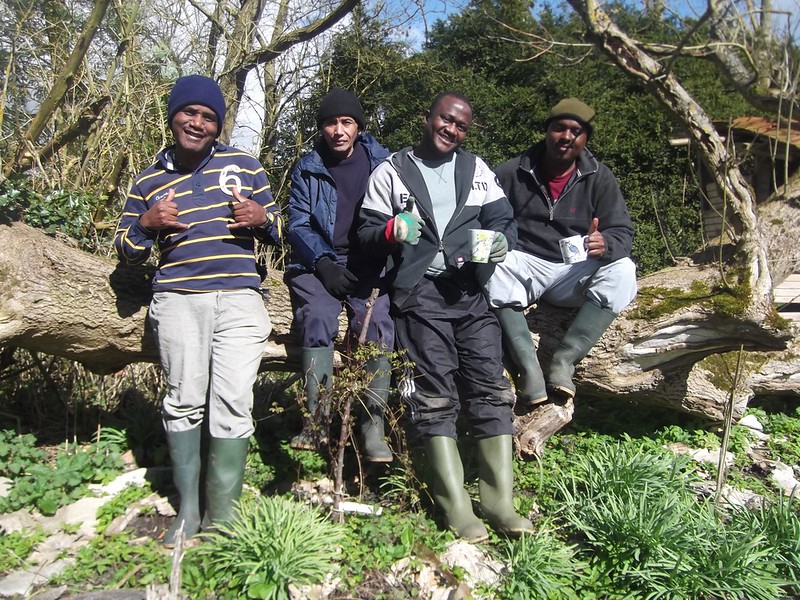 By Ben Margolis
By Ben Margolis
In 2014, the UN announced that more than 50 million people were living forcibly displaced from their homes for the first time since the Second World War. In Europe, Australia, the US and elsewhere there is widespread talk of a ‘migration crisis’ with governments panicking and erecting walls, fences and military defences to keep people out.
It is interesting to note that nearly 90% of those forcibly displaced people are in the Global South. It seems likely that economically richer countries are going to see a growing number of refugees and asylum seekers. This is due to the increasing impacts of climate change, inequality, resource scarcity and war.
Anyone who has studied permaculture will have come across David Holmgren’s principle of ‘Use and Value Diversity,’ as well as Bill Mollison’s principle that ‘The problem is the solution’. So in an era of increasing diversity and a perceived ‘problem’ of growing numbers of refugees and asylum seekers, how can the permaculture community respond?
The Grange: Helping to Build Resilience
Since 2012, my wife Sophie and I have been welcoming survivors of torture and others who have fled persecution to our 10 acre smallholding in the small village of Great Cressingham in West Norfolk.
In three years we have built up a network of partners through whom more than 300 refugees have come to stay with us, normally for a week at a time, during which we cook, eat, play, garden, live and learn together. We wanted to share a few of our experiences and the lessons we have learned over this time.
Many people claiming asylum in the UK have fled from horrific persecution, and survived extraordinary journeys to reach the UK. However, life in the UK can come as a shock as the asylum system is harsh and unforgiving and many people wait years to hear if they will be allowed to stay, during which time they live in poverty or destitution, and are often isolated and lonely, living removed from their own culture and kinsfolk.
We have had many people staying with us who have been waiting more than a decade to find out if they will be able to stay in the UK, whilst facing the daily fear of being sent home to certain torture or even death.
Small acts of trust
Every person who comes to The Grange is welcomed as part of our eclectic and ever-changing family. We do everything we can to ensure integration – both with our family, but also the local community who we have found very open and supportive to what we do. We also find all sorts of ways to make it clear that they are not here for charity. We want to learn from them as much as they feel they can learn from us.

We have been taught incredible recipes from all over the world, different gardening techniques that we have started to use in our vegetable garden, ways of communicating and making decisions as a group, different styles of music and song – and more than anything, that people are incredibly resilient. It humbles and inspires us that people who have suffered so much can still share so much warmth, trust and openness. Our small acts of trust are reciprocated a thousand times.
I did my Permaculture Design Course with Hannah Thorogood in 2011 as we were preparing to move to The Grange. I always remember on the first day her saying that between everyone in the room she felt we had all the skills and knowledge to change the world. We feel like that with every group of people who stay at The Grange. We have had midwives, engineers, foresters, gardeners, camel herders, bookkeepers, IT workers, chefs, musicians and countless other talented people staying here.
We have seen a shy, young Eritrean girl get the confidence to learn bricklaying and do a fantastic job to brick up a doorway in one of our outbuildings. We have watched as people who appear terrified when they arrive grow throughout the week they are here – and then become important members of our community as they return time and time again. We have smiled to see a wonderful man from Burundi who has visited many times take the ponies out for a walk with the children from next door, chatting away as they head up the driveway.
From what we have learned over the last three years, I am now developing a permaculture course for asylum seekers with a good friend who is a psychotherapist, gardener, and part of a group of Elders who support our work at The Grange. We want to show participants how much they have to offer, and eventually I would love to see some of our graduates becoming designers, diploma holders and teachers, and bringing their wealth of knowledge and experience to the permaculture community in the UK.
Seven-generation thinking
In Bill Mollison’s ‘A Designer’s Manual’ he talks about how ‘Beneficial behaviour involves managing natural systems for their own, and our, long-term benefit, not for our immediate and exploitative personal gain.’ I would argue that the same applies to the way we manage our ever-changing and dynamic communities.
He goes on to say that the American Indians (Irequois nation) frame this as a ‘seventh generation’ concept: that our decisions now are carried out in terms of their benefits or disadvantages to our descendants in seven generations time (about 100 years ahead).’ Coincidentally, it is just over 100 years since my family fled to the UK from Russia and Turkey, fleeing the persecution of the Jews and looking for a safe place to live. They relied then on some people seeing that our collective long-term benefit comes from looking at how to integrate communities, rather than being divisive and seeing only difference and segregation.
Permaculture and refugees
 Permaculturists are in a great position to work with, but more importantly, to learn from, refugee communities. The ethics of permaculture implore us to people care and fair shares. Many of the core principles of permaculture show the need for diversity, integration and creatively responding to change.
Permaculturists are in a great position to work with, but more importantly, to learn from, refugee communities. The ethics of permaculture implore us to people care and fair shares. Many of the core principles of permaculture show the need for diversity, integration and creatively responding to change.
There are already great examples of projects with permaculture ethics at their heart being led by, or run with, refugees including The E5 Bakehouse, Mazi Mas, the Ice and Fire Theatre company and many more.
Over the next few months I am hoping to develop some resources to help everyone, whether in town or country, land-based or non land-based, find ways to integrate with their local refugee communities for the benefit of everyone. If you have ideas, or thoughts you would like to share on this, please do get in touch.
You can see more about The Grange on our Facebook page.